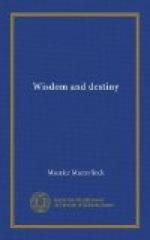26. We shall not become wise through worshipping reason alone; and wisdom means more than perpetual triumph of reason over inferior instincts. Such triumphs can help us but little if our reason be not taught thereby to offer profoundest submission to another and different instinct—that of the soul. These triumphs are precious, because they reveal the presence of diviner instinct, that grows ever diviner still. And their aim is not in themselves; they serve but to clear the way for the destiny of the soul, which is a destiny, always, of purification and light.
27. Reason flings open the door to wisdom; but the most living wisdom befinds itself not in reason. Reason bars the gate to malevolent destiny; but wisdom, away on the horizon, throws open another gate to propitious destiny. Reason defends and withdraws; forbids, rejects, and destroys. Wisdom advances, attacks, and adds; increases, creates, and commands. Reason produces not wisdom, which is rather a craving of soul. It dwells up above, far higher than reason; and thus is it of the nature of veritable wisdom to do countless things whereof reason disapproves, or shall but approve hereafter. So was it that wisdom one day said to reason, It were well to love one’s enemies and return good for evil. Reason, that day, tiptoe on the loftiest peak in its kingdom, at last was fain to agree. But wisdom is not yet content, and seeks ever further, alone.
28. If wisdom obeyed reason only, and sought nothing more than to overcome instinct, then would wisdom be ever the same. There would be but one wisdom for all, and its whole range would be known to man, for reason has more than once explored its entire domain.
Certain fixed points there well may be that are common to all classes of wisdom; but there exists none the less the widest possible difference between the atmospheres that enwrapped the wisdom of Jesus Christ and of Socrates, of Aristides and Marcus Aurelius, of Fenelon and Jean Paul. Let the same event befall these men on the self-same day: if it fall into the running waters of their wisdom, it will undergo complete transformation, becoming different in every one; if it fall into the stagnant water of their reason, it will remain as it was, unchanged. If Jesus Christ and Socrates both were to meet the adulterous woman, the words that their reason would prompt them to speak would vary but little; but belonging to different worlds would be the working of the wisdom within them, far beyond words and far beyond thoughts. For differences such as these are of the very essence of wisdom. There is but one starting-point for the wise—the threshold of reason. But they separate one from the other as soon as the triumphs of reason are well understood; in other words, as soon as they enter freely the domain of the higher unconsciousness.




